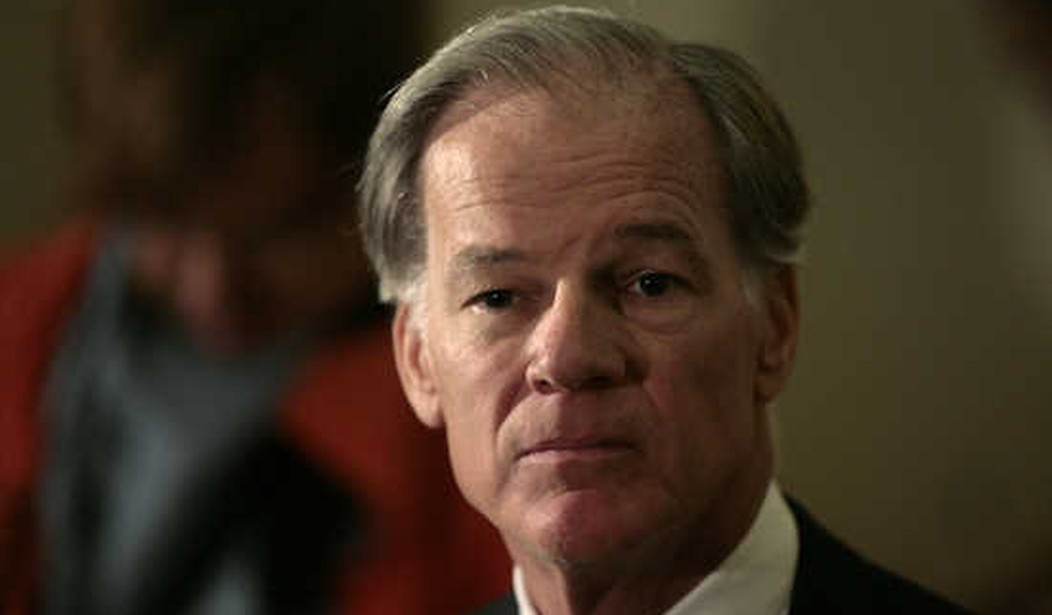The potential Republican challengers to Gov. Dannel Malloy (D) faced off for the first time on July 16, with candidates sparring over state budgets and Common Core.
During the debate Tom Foley, the envoy to Ireland under President George W. Bush, and state Senate Minority Leader John McKinney outlined how their policies diverged from one another, how they would be better for Connecticut and how Malloy’s policies have led the state in the wrong direction.
Both men held steadfast in their criticism of the incumbent governor regarding virtually all of his tax and education policies and how, under his leadership, Connecticut has experienced slower than average economic recovery following the recession. Foley said that part of his plan, if elected, included holding the spending rates to current levels, which would represent an 8 percent spending cut for fiscal year 2015. He also blasted McKinney for passing five budgets, each of which raised spending.
“Why should the citizens trust you to do something different than you did when you were holding office?” Foley asked his opponent.
McKinney said that Foley had never put together a state budget, and therefore had no idea what that process entailed. He said that the legislature’s Republican-proposed budget actually decreased spending and it was the majority party who is responsible for the increases.
Throughout the debate, Foley said that his opponent’s voting record proved that he was more of an ally of Malloy than an opponent – accusing him of being part of an establishment legislature that, literally, hasn’t helped the trains to run on time, citing the state’s issues with Metro North. McKinney said that the governor has failed to hold Metro North accountable for their failures, which would be a priority if he were elected.
Foley and McKinney did agree that Malloy had improperly diverted $189 million from the special Transportation Fund and that he has failed to hold Metro North accountable for their failures. McKinney dismissed the notion that the state should implement a highway toll system as “just another tax,” saying that the road and bridge infrastructure problem was not one of revenue.
“We have a spending problem,” he said. “We wasted half-a-billion on a bus system no one is going to use.”
The candidates also agreed that Malloy had failed the state’s students and teachers with the adoption of the Common Core standards. Foley said that McKinney was implicit in the passage of the education reforms that included Common Core. McKinney said that, in fact, the legislature didn’t vote directly on that legislation and that he would make repealing Common Core a priority of his administration, saying the policy is destroying public schools.
Foley took a different approach, saying he would repeal Common Core as a mandate for every school, but that he would recommend the regime for underperforming schools. He also said he would support reading and writing tests for third grade and high school students to ensure that they had the tools to graduate to the next level, stressing they can’t learn if they can’t read.
McKinney also played up his role as the representative for Newtown – the site of the 2013 shooting at Sandy Hook Elementary School – saying that he had no interest in changing or repealing the firearm reforms that were signed into law following the catastrophe.
“I don’t think anybody as the state senator of Newtown would have done anything differently,” he said. “… [Foley] sat on the sidelines and criticized and has yet to offer one specific plan as to what he would do.”
Foley called the Newtown tragedy a symptom of the larger mental health and gun violence problems in the state. He briefly discussed his personal experience with mental health issues, acknowledging a sister that has been under his care for 40 years. Foley said the firearms bill championed by McKinney had done nothing to address an underlying issue of mass gun violence – mental health.
“The resources simply aren’t there for families that have mental health challenges… most of these tragedies with multiple murders are the result of mental health issues,” Foley said. “The state of Connecticut and other states simply don’t offer enough for families … to provide what the families need.”
Foley said that there was parity in terms of insurance coverage for those with mental health issues and that, as governor, he would support measures that would include coverage for early identification tests and try to fight the stigma that prevents the larger conversation about mental health.
The candidates each accused Malloy of having too many friends in the insurance industry to be able to make any real changes to the industry, citing his vetoing of a bill that would have required insurance companies to release data related to mental health care treatment.
A June 19 Quinnipiac poll prior to the debate showed Foley leading McKinney 36 percent to 11 percent as the favorite for the Republican nod. In that poll Foley was also ahead of Malloy in the hypothetical governor’s race, 43 percent to 40 percent.
(For complete 2014 midterm coverage, get your campaign fix on The Grid.)









Join the conversation as a VIP Member